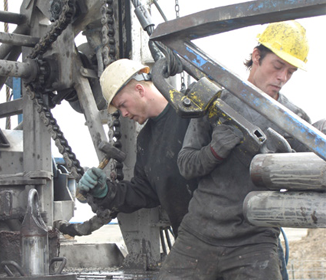Oil Rig Jobs are exciting and rewarding, they are also challenging and potentially dangerous. However, for the person who enjoys working hard, being productive with the hands, loves being a team player, and does not mind working odd hours, oil rig jobs would be something to consider. An aspect of oil rig jobs that many people do not realize is the variety of career possibilities. In fact, a job such as this has opportunities for people without professional training, as well as those who have undergone extensive education and training. The bottom line is that when first getting started, a person would be labeled a Roustabout or Roughneck, which is explained below.The following are just a few examples of oil rig jobs although a number of additional options exist.
Roustabout / Roughneck
As a roustabout or roughneck, job responsibilities would cover oil rig maintenance. At this level, duties would include gathering and assembling necessary equipment, painting, deck cleaning, and so on. Typically, a roustabout or roughneck is an entry level worker who has the chance to learn more vital job functions, which in turn would create opportunities for advancement. Working at sea, this particular job pays anywhere from $33,000 to $45,000 a year. Just two years ago, an offshore roustabout/roughneck earned around $35,000 a year but with such great demand, this particular job now pays upwards of $51,000 annually. Then for maintenance roustabouts, annual income is around $47,000 and for someone working offshore on the drill floor, approximately $54,000. Additionally, this individual would also be provided with room and board, as well as meals and incentive bonuses when working offshore.
Brazer and Welder
Both brazers and welders attach the wellhead and pumping equipment to the oil field casing. These oil rig jobs are somewhat dangerous in that they often work around fuels and volatile gases. As far as income, a brazer and welder would make around $40,000 a year.
Motorman
Another job position for oil rig jobs is the motorman. In simple terms, this person would be the on duty mechanic, keeping machinery in prime working condition. Although a motorman is responsible for a variety of motorized machines on oil rigs, generators and pumps are usually the primary focus. Often, a roustabout or roughneck will move up to motorman job duties or for someone hired on as a motorman, previous work experience as a ship mechanic or power plant mechanic would be common.
Derickhand
Some oil rig jobs are somewhat mundane while others are considered risky as in the case of the derickhand. In this position, a person works on the upper portion of the drill pipe and while at great heights, the focus would be to ensure the drill pipe is set back properly in the hole and then attached to the pipe string. While this is the main job responsibility, the derickhand often mixes mud and operates the mud equipment system. On average, this job pays $35,000 to $37,000 a year.
Driller
One of the more advanced types of oil rig jobs is the driller. When on oil rigs, shifts are generally covered by two, possible three crews that work as close teams. The main function of an oil driller is overseeing crews to include mandating proper attire, ensure work performances were aligned with regulations, and most importantly, that all jobs were being performed safely. As a part of this supervisory position, the individual would make sure all crewmembers were dressed appropriately for the work being done, all equipment was in top working order, and that new crewmembers were provided with training. Reporting to a head manager, the oil driller easily makes $80,000 and up although more could be earned for someone with relevant experience and/or training.
Crane Operator
An offshore crane operator performs job duties while on a drilling platform. In addition to transporting drill pipe, this individual would also be responsible for getting needed supplies from boats down to the drilling floor. Another responsibility of the crane operator would be supervising any roustabouts/roughnecks and assistant crane operators on the rig. As with other oil rig jobs, this one is in high demand and for earning potential, most make between $72,000 and $75,000 a year.
Petroleum Engineer
While advanced education and training are necessary to work as a petroleum engineer, job security and pay are great. In this case, the calculation, as well as design for various procedures specific to drilling and oil well production would be the primary job responsibility. Because this is a specialized area, a person could make on average $120,000 a year.
Miscellaneous
A few of the additional oil rig jobs available include those listed below although this is not a full list of opportunities.
- Barge Engineer – $89,000
- Camp Boss – $64,000
- Company Man/Woman – $160,000
- Electronic Technician – $74,000
- Medic – $69,000
- Oil Rig Safety and Training Coordinator – $80,000
- Radio Operator – $62,000
- Scaffolder – $57,000
- Steward/Stewardess – $45,000
- Subsea Engineer – $86,000
- Tool Pusher – $108,000
Education and Training for Oil Rig Jobs
The fact is that people who complete proper education and training make more money than those with little to none. Keep in mind that all types of oil rig jobs are in high demand around the globe so not only is this job secure but also earning potential is excellent. To secure the best jobs and have the best opportunities for advancement, it would be critical to gain specialized education and training. Around the world are a number of top rated schools that offer various programs pertaining to different oil rig jobs.

